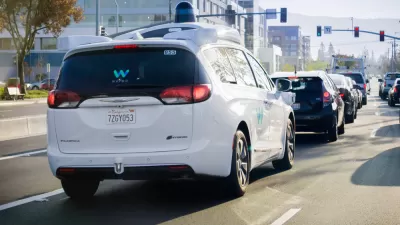On January 8, the U.S. Department of Transportation released "Ensuring American Leadership in Automated Vehicle Technologies: Automated Vehicles 4.0 (AV 4.0)." On January 11, it followed up with the Automated Vehicles Comprehensive Plan (AVCP).

The U.S. Department of Transportation on Monday released the "Automated Vehicles Comprehensive Plan" (AVCP), with stated goals to "promote collaboration and transparency, modernize the regulatory environment, and prepare the transportation system for the safe integration of Automated Driving Systems (ADS)," according to a U.S. DOT press release.
"This comprehensive plan lays out a vision for the safe integration of automated vehicles into America’s transportation system while ensuring that legitimate concerns about safety, security, and privacy are addressed," according to a statement from Secretary Elaine L. Chao, whose controversial resignation from the position became official on the day the AVCP was announced.
The AVCP builds on previous work by the U.S. Government to prepare for autonomous vehicles, outlined most recently in "Ensuring American Leadership in Automated Vehicle Technologies: Automated Vehicles 4.0" (AV 4.0), released earlier this month for attendees of the all-digital CES confab. An article by David Shepardson provides insight into the AV 4.0 document, quoting former Secretary Chao disparaging the approach of the Obama administration to autonomous vehicle regulation.
"The 51-page 4.0 policy document released [on January 8] says the U.S. government will adopt and promote 'flexible, technology-neutral policies that will allow the public, not the federal government or foreign governments, to choose the most economically efficient and effective transportation and mobility solutions,'" writes Shepardson.
FULL STORY: U.S. Department of Transportation Releases Automated Vehicles Comprehensive Plan

Alabama: Trump Terminates Settlements for Black Communities Harmed By Raw Sewage
Trump deemed the landmark civil rights agreement “illegal DEI and environmental justice policy.”

Study: Maui’s Plan to Convert Vacation Rentals to Long-Term Housing Could Cause Nearly $1 Billion Economic Loss
The plan would reduce visitor accommodation by 25% resulting in 1,900 jobs lost.

Planetizen Federal Action Tracker
A weekly monitor of how Trump’s orders and actions are impacting planners and planning in America.

Wind Energy on the Rise Despite Federal Policy Reversal
The Trump administration is revoking federal support for renewable energy, but demand for new projects continues unabated.

Passengers Flock to Caltrain After Electrification
The new electric trains are running faster and more reliably, leading to strong ridership growth on the Bay Area rail system.

Texas Churches Rally Behind ‘Yes in God’s Back Yard’ Legislation
Religious leaders want the state to reduce zoning regulations to streamline leasing church-owned land to housing developers.
Urban Design for Planners 1: Software Tools
This six-course series explores essential urban design concepts using open source software and equips planners with the tools they need to participate fully in the urban design process.
Planning for Universal Design
Learn the tools for implementing Universal Design in planning regulations.
Caltrans
Smith Gee Studio
Institute for Housing and Urban Development Studies (IHS)
City of Grandview
Harvard GSD Executive Education
Toledo-Lucas County Plan Commissions
Salt Lake City
NYU Wagner Graduate School of Public Service





























